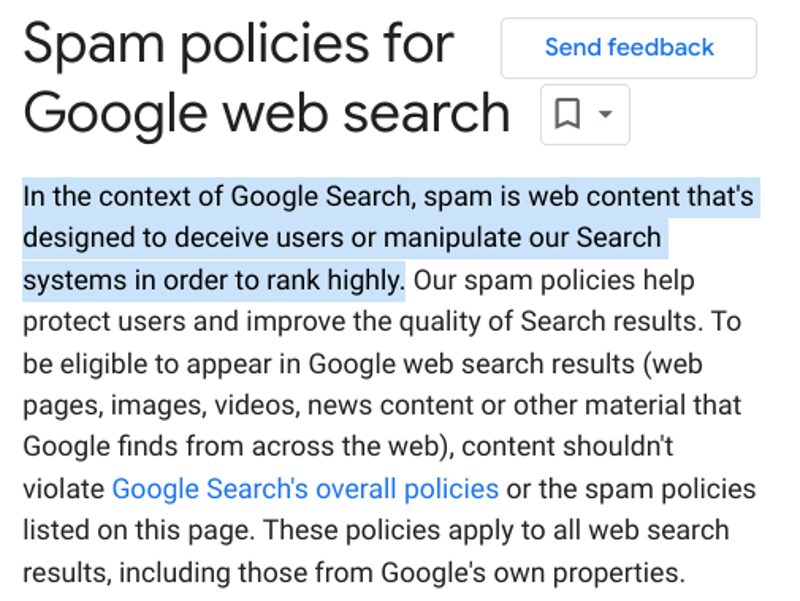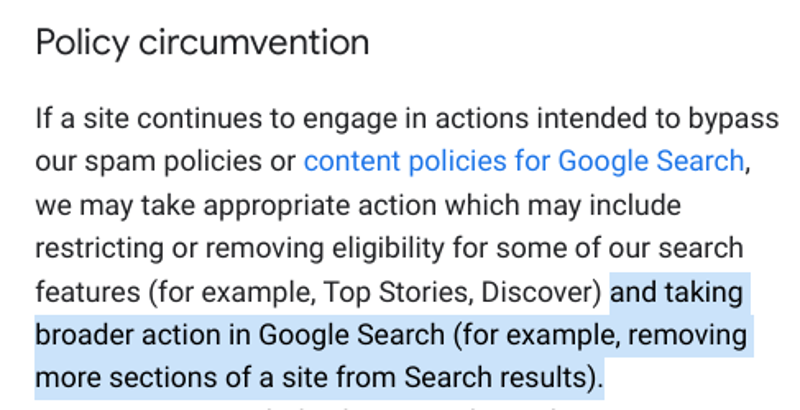
Google has updated their documentation on their spam policies. This latest update to the spam guidelines has several changes I thought were interesting enough to write about.
1. Manipulation of search = spam
Google added this to the beginning of their document:

It's no surprise that content designed to deceive users is spam, but this part, "or manipulate our Search systems in order to rank highly," describes a lot of the content that is created for the web today.
2. Removed: Links are used in determining relevancy
Well this is an interesting wording change!

Now, it's possible nothing has changed in regards to how Google uses links and this is just a wording change made for the sake of brevity. I think things have changed though. It's possible that Google is relying much more on vector search now in determining which content is likely to be relevant to a search query. The advancements in machine learning architecture announced in February of 2024 made it so that Google's large language models have a massive context window and are able to efficiently process large amounts of text. I would think this would allow for more capabilities for the vector spaces used in search as well by systems such as RankBrain, DeepRank and RankEmbed BERT. Also, version 0.6.0 of the API files shows the capability of dividing documents into Chunks, which would further allow Google to use vector search rather than traditional PageRank driven features to determine which parts of content are likely to be relevant.
3. Site reputation abuse changes are clarified
Site reputation abuse is relatively new to Google's spam policies. They handed out manual actions for Site reputation abuse to sites in early May 2024 which included many sites with coupon domains run by third parties. Google has said that algorithmic enforcement is coming - but has not done anything yet.
- They removed the part I've bolded here: Such third-party pages include sponsored, advertising, partner, or other third-party pages that are typically independent of a host site's main purpose or produced without close oversight or involvement of the host site, and provide little to no value to users.
- All of this was added. (I've bolded the bit I thought was most interesting): "Close oversight or involvement is when the first-party hosting site is directly producing or generating unique content (for example, via staff directly employed by the first-party, or freelancers working for staff of the first-party site). It is not working with third-party services (such as "white-label" or "turnkey") that focus on redistributing content with the primary purpose of manipulating search rankings.
- They changed this example of something NOT considered site reputation abuse: “Coupons that are listed with close involvement of the hosting site” was changed to “Coupons that are sourced directly from merchants and other businesses that serve consumers.”
My interpretation of these changes is that if a site such as a newspaper site sources out coupons and has a coupon subdomain that's fine. But, if a news site enters an agreement with a third party who does the work and hosts on a subdomain of the newspaper, then this is site reputation abuse - taking advantage of the authority of the news site for ranking purposes.
4. Violate the spam policies repeatedly and you may be removed from Search
The section on policy circumvention is written to site owners that continually create content to manipulate rankings rather than to serve the needs of their audience. The part I've highlighted below was added.

It sounds to me like this opens the door for Google to silently and without warning remove sites or sections of sites from Search for repeated attempts at manipulating search results.
We may be in for some interesting times.



Comments are closed.